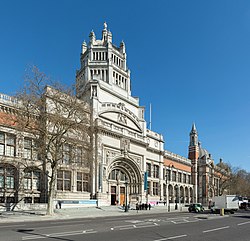
Back متحف فكتوريا وألبرت Arabic متحف فكتوريا والبرت ARZ Muséu de Victoria y Alberto AST Viktoriya və Albert Muzeyi Azerbaijani Музей Вікторыі і Альберта Byelorussian Музэй Вікторыі і Альбэрта BE-X-OLD Виктория и Албърт (музей) Bulgarian Victoria and Albert Museum Catalan Victoria and Albert Museum Czech Amgueddfa Victoria ac Albert Welsh
 Logo introduced in 1989 | |
 The museum's main entrance | |
Former name | Museum of Manufactures, South Kensington Museum |
|---|---|
| Established | 1852 |
| Location | Cromwell Road, Kensington and Chelsea, London, SW7 |
| Coordinates | 51°29′47″N 00°10′19″W / 51.49639°N 0.17194°W |
| Type | Art museum |
| Collection size | 2,800,000 objects in 145 galleries |
| Visitors | 3,110,000 (2023)[1] |
| Director | Tristram Hunt[2] |
| Owner | Non-departmental public body of the Department for Culture, Media and Sport |
| Public transit access | |
| Website | https://www.vam.ac.uk |
The Victoria and Albert Museum (abbreviated V&A) in London is the world's largest museum of applied arts, decorative arts and design, housing a permanent collection of over 2.8 million objects.[3] It was founded in 1852 and named after Queen Victoria and Prince Albert.
The V&A is in the Royal Borough of Kensington and Chelsea, in an area known as "Albertopolis" because of its association with Prince Albert, the Albert Memorial, and the major cultural institutions with which he was associated. These include the Natural History Museum, the Science Museum, the Royal Albert Hall and Imperial College London. The museum is a non-departmental public body sponsored by the Department for Digital, Culture, Media and Sport. As with other national British museums, entrance is free.
The V&A covers 12.5 acres (5.1 ha)[4] and 145 galleries. Its collection spans 5,000 years of art, from ancient history to the present day, from the cultures of Europe, North America, Asia and North Africa. However, the art of antiquity in most areas is not collected. The holdings of ceramics, glass, textiles, costumes, silver, ironwork, jewellery, furniture, medieval objects, sculpture, prints and printmaking, drawings and photographs are among the largest and most comprehensive in the world.[5]
The museum owns the world's largest collection of post-classical sculpture, with the holdings of Italian Renaissance sculpture being the largest outside Italy. The departments of Asia include art from South Asia, China, Japan, Korea and the Islamic world. The East Asian collections are among the best in Europe, with particular strengths in ceramics and metalwork, while the Islamic collection is amongst the largest in the Western world. Overall, it is one of the largest museums in the world.
Since 2001 the museum has embarked on a major £150m renovation programme. The new European galleries for the 17th century and the 18th century were opened on 9 December 2015. These restored the original Aston Webb interiors and host the European collections 1600–1815.[6][7] The Young V&A in east London is a branch of the museum, and a new branch in London – V&A East – is being planned.[8] The first V&A museum outside London, V&A Dundee opened on 15 September 2018.[9]
- ^ "British Museum is the most-visited UK attraction again". BBC News. 18 March 2024. Retrieved 18 March 2024.
- ^ Stewart, Heather (13 January 2017). "Tristram Hunt to quit as MP to become V&A director". The Guardian. ISSN 0261-3077. Retrieved 13 January 2017.
- ^ "V&A About us". Victoria and Albert Museum.
- ^ "FuturePlan: Victoria and Albert Museum". vam.ac.uk. 6 May 2011. Retrieved 12 May 2011.
- ^ Ferren, Andrew (13 May 2024). "How to Navigate London's Wondrous (and Very Big) V&A Museum". The New York Times. ISSN 0362-4331. Retrieved 17 May 2024.
- ^ "'Our Europe is an inclusive Europe': the Victoria and Albert Museum's new European Galleries". Apollo. 4 December 2015.
- ^ "FuturePlan Live: Europe 1600 – 1815". Victoria & Albert Museum. Archived from the original on 8 December 2015.
- ^ "V&A East". Victoria and Albert Museum. Retrieved 21 July 2022.
- ^ Cite error: The named reference
moorewas invoked but never defined (see the help page).
